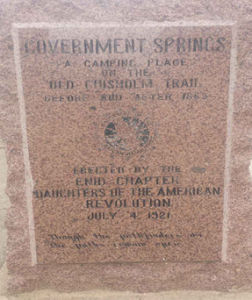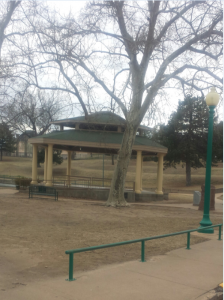Government Springs Park was once the pride of Enid, Oklahoma. During my childhood, government was considered a good thing, so we often used that full name in admiration. Today it’s usually called simply Springs Park. Every school child knew it had been a camp site on the old Chisholm Trail, the best known of the routes used to drive cattle from Texas to the Kansas railroads after the Civil War.

It was a perfect campground: hills overlooking the flat land where the cattle grazed and, most important, the drinking water from natural springs that fed the lake. These things also made a perfect park for children: the flat land – then punctuated with unsafe but exciting wooden swings, hand-operated merry-go-rounds, and seesaws – was great for running. We could drink from the springs, at that time corralled by a pipe. I’m sure the water was less than pure, but I never knew anyone to get sick from it. We could climb the gentle hills to the swimming pool, and, on special occasions, my father would spring for a quarter to rent a rowboat to take us on the lake.
It was a child’s paradise except that we could never climb the steeper hills on the south side of the lake. That was reserved for the “colored people,” as the other two-thirds of the park was reserved for whites. I was curious, as children are about anything forbidden, but never dared to go. I understood my parents didn’t agree with the law, but it was the law, and arguing was not permitted.

I was still in high school when the city opened a larger park on the more prosperous west side of town. From then on, Springs Park began to get less attention. Every time I’ve gone back to Enid, I’ve visited Springs Park, and it’s always made me a little sad. While the minimum maintenance was performed, the pavilions were run down, the grass was not manicured, and the trash not picked up frequently. The last time I went, it was different. I hadn’t been home in several years and dreaded to see how much the park had aged.
What a surprise! All the old swings, seesaws, and merry-go-rounds had been replaced with modern, safe playground equipment, shining brightly. It was a weekday morning, so only a few people were in the park, five small groups altogether.
Two of them were racially diverse, black and white. My nephew told me that the park is now the site of the annual Juneteenth party, celebrated by the African American community as a commemoration of the day when news of the end of the Civil War reached Texas. It was about 100 years later when Blacks were finally allowed to use the whole park.
I also learned that the Gay Pride celebration is held in Springs Park. The Enid I grew up in didn’t have any open gays. The word hadn’t yet been popularized and if used at all, it meant something like ‘happily frolicking’. The polite term was “homosexual,” but people rarely used polite terms when they whispered their misapplied stereotypes about athletic women and artistic men.
Once urban people thought small towns were romantic, and small town people thought big cities were glamorous. Today, I’m afraid that has changed. Too many metropolitans, like me, are inclined to think of the small-town dwellers as ignorant and bigoted, and often they, in turn, see our cities as sinful and jaded. I don’t know if that will change – I only know that my journey home isn’t as far as it used to be.
21,077 Total Views, 9 Views Today






